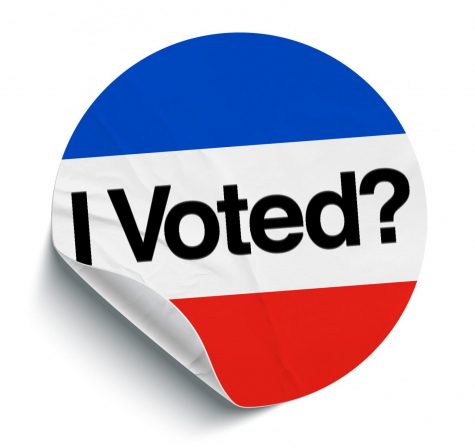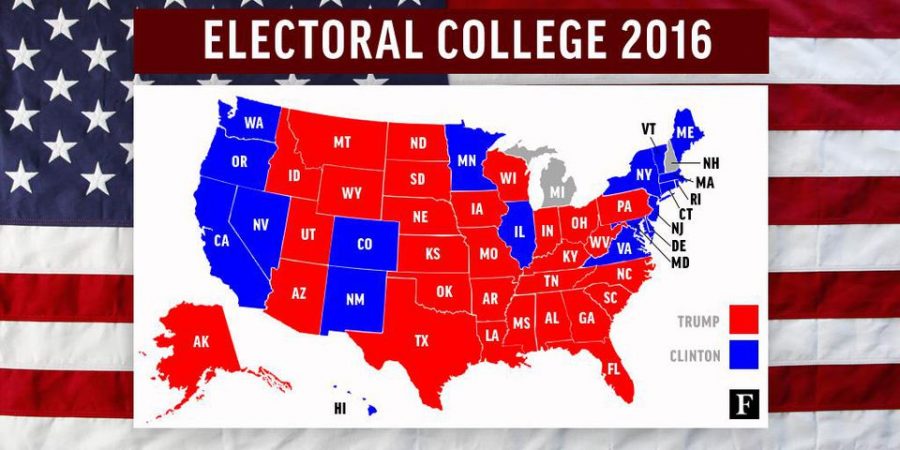Does Your Vote Really Count?
Why the United States Should Abolish the Electoral College
In 2016, almost 3 million more people voted for Hillary Clinton than Donald Trump. However, Trump won the election because he got 304 electoral college votes, while Clinton only got 277. This begs the question, is the electoral college still representative of the American people in 2020?
The electoral college process was devised during the creation process of the U.S. after the Revolutionary War, when the Founding Fathers were deciding on the best systems for America’s government. At the time, there was no good representative country that had a democracy that Americans could look to as an example. Some thought that 18th century Americans wouldn’t be able to make good choices, and that Congress should elect the President. Others, however, didn’t want another leader too powerful like King George and felt that the people should have more of a say in their new president. Thus, the electoral college became a compromise, where the first president to get to 270 electoral votes wins. Each state has a certain number of electors based on their population.
However, now, in 2020, we have millions of resources to be able to make rational decisions and America has evolved past the need for representatives to vote for us. With a few clicks, we can find seemingly endless pages of news sources, 24 hr news on tv, and live debates, where Americans can see first hand what their presidential candidate is like and what they believe in.
According to Jack Rackove in an article from Corrie Goldman in Stanford News, he said “I believe the existing system has two fundamental – I wish I could say fatal – flaws. One is that it violates the one person, one vote rule, which should be the proper rule of a modern democracy, because the addition of two electors to each state for its senators produces significant distortions in how much our individual vote is worth from state to state.” People in states like California, which are almost always blue, may feel as though their vote does not matter as much as someone in Florida’s, where their swing state changes each election, and their votes are very important to determine whether they will be red or blue that year.
An article by Jacob Weindling in Paste Magazine said, “The 2020 election is likely going to come down to just four: Florida, Michigan, Pennsylvania, and Wisconsin. Those four states comprise 86% of the current true tossup EVs, and 32% of the total votes needed to win, all while housing just 15% of the population.” The president should be voted on by everybody, and the state you live in shouldn’t matter when voting.
Likewise, Rackove said “The second problem is the whole battleground state issue. Once we’re past the primaries, presidential campaigns are wholly preoccupied with the relatively small number of states that are actually competitive. But their competitiveness is just a demographic accident. There’s nothing special about them except that their populations happen to be fairly evenly divided from a sociological standpoint.” Candidates try to appeal to particular swing states to get their votes rather than if a Republican candidate tries to win over a state like Kansas, where they know they will win.
Unfortunately, according to Jamelle Bouie from The NY Times, “[what happened in 2016] could happen again. A 2018 report on America’s future political demography found four realistic scenarios in which Democrats win the national popular vote but lose the Electoral College because of the geography of the electorate. The 2020 election could be the third time in six elections that the White House went to the loser of the popular vote.” Is it fair that, in 2020, 24 years’ worth of presidents could have been chosen, not by the majority vote, but by representatives of their state? The electoral college system is not representative of the majority of American’s views, as seen in 2016 with Clinton and Trump. If this situation happens again between Biden and Trump, then it will be clear that this system is flawed, and that he is not the president the majority of the American people support.

Abolishing the electoral college is not a new idea, either. According to an article by Darrens M. West in Brookings Edu, “For years, a majority of Americans have opposed the Electoral College. For example, in 1967, 58 percent favored its abolition, while in 1981, 75 percent of Americans did so.” Now, however, this issue has become very polarized, with Democrats mostly supporting a direct vote and Republicans mostly in favor of the electoral college.
In an article published by Gallup in September 2020, 61% of Americans now support amending the Constitution to eliminate the electoral college in presidential elections, with 89% of Democrats and 23% of Republicans favoring the popular vote.
Overall, the electoral college is an unnecessary, outdated, and unfair system that needs to be seriously and thoughtfully re-evaluated to serve the views and opinions of the American people. We can make our own rational, educated, and intelligent decisions, and our president should be elected not on a few swing states, but by the popular vote and majority rule.

